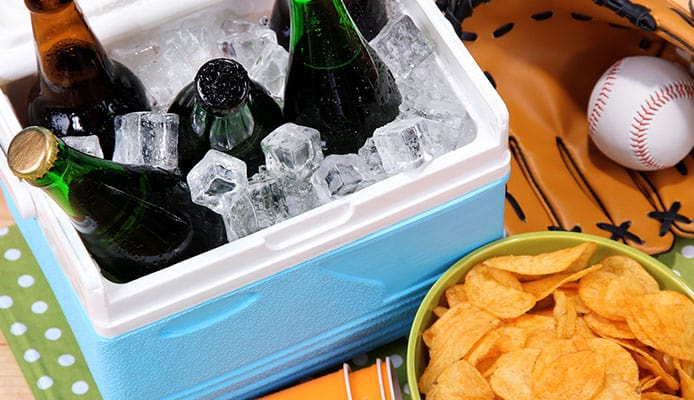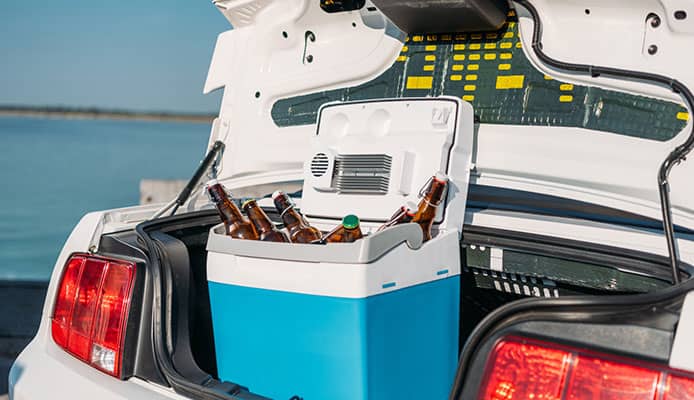
-
1.
-
2.
-
3.
-
4.
-
5.
Ice packs retain ice incredibly well and are the ideal option when you want ice to last longer in your cooler and your cooler contents to stay chilled and fresh for longer. You can also use them in combination with regular ice to keep normal ice block frozen for longer and avoid having to deal with a watery mess at the end of the day. The ice pack cooling power you get will depend on the quality of the cooler packs you use.
Below, we’ve reviewed the best reusable ice packs for coolers available on the market. They range from rugged and long lasting ice packs to use when camping, fishing, hiking, tailgating and kayaking for extended durations in hot weather to slim cooler packs for lunch boxes and everyday use. They are all non-toxic and safe to use and top rated for their cooling performance. We have also outlined the factors to consider to determine which ice packs are best for your cooling needs.
OUR TOP PICK
Cooler Shock Cooler Freezer
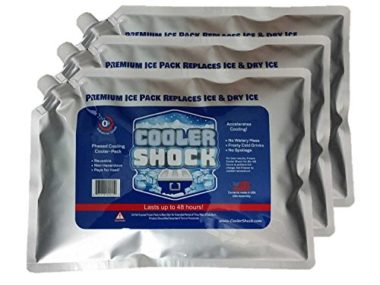
- Stand Out Features - Why We Love It
- Long lasting freezer packs - ideal for long outdoor excursions
- Stay frozen and keep things chilled for days
- Durable - can go through 100’s of freeze cycles
- Non-hazardous and child safe
- Tough nylon reinforced shell
- Easy to use and clear directions are provided
- Variety of sizes for a range of applications
- One-year unconditional warranty
Dimensions of Individual Ice Pack: 10 x 14 x 1.5 inches
Total Pack Weight: 1.25 pounds
EDITORS CHOICE
Healthy Packers
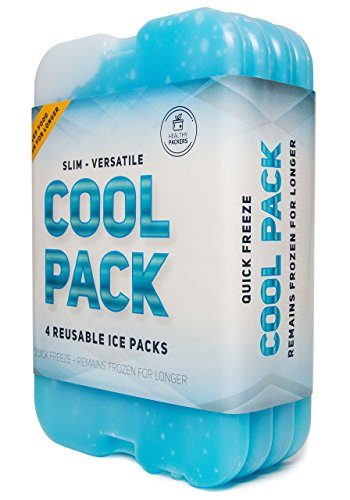
- Stand Out Features - Why We Love It
- Slim and lightweight design for compact lunch boxes and soft coolers
- Non-toxic gel pack and BPA free casing
- Sufficient longevity for keeping lunch cold and fresh
- Easy to clean and quick freezing for reuse
- Can go through TSA security checkpoints
- Leak-proof design
Dimensions of Individual Ice Pack: 7 x 4.7 x 0.5 inches
Total Pack Weight: 1.75 pounds
BEST VALUE
Fit & Fresh
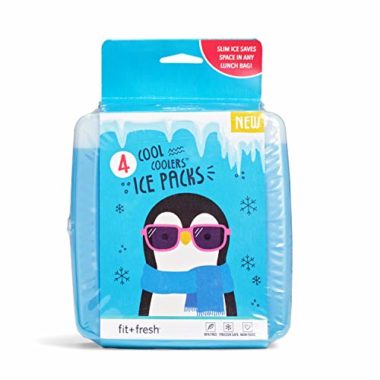
- Stand Out Features - Why We Love It
- Super compact and slim ice packs for lunch boxes
- Stackable to increase cooling power
- Grooves on ice packs for stacking together
- Non-toxic and BPA-free
- Easy to hand wash and refreeze for reuse
Dimensions of Individual Ice Pack: 4.75” x 4.75” x 0.50”
Total Pack Weight: 1 pound
Bentgo Ultra-thin Lunch
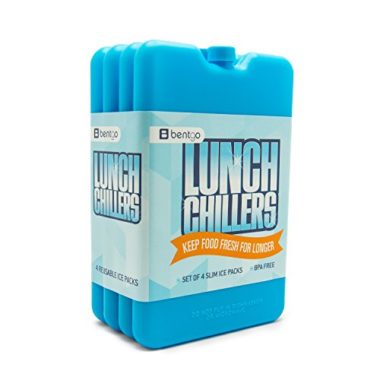
- Stand Out Features - Why We Love It
- Ultra-thin and space efficient design
- Large surface area for maximum cooling performance
- Fit easily in many lunch boxes and bags
- Non-toxic and BPA-free
- Backed by a 1 year warranty
- Easy to use and clean
Dimensions of Individual Ice Pack: 6.5″ x 4.25″ x 0.3″
Total Pack Weight: 1.7 pounds
Thrive Ice Pack for Lunch Boxes
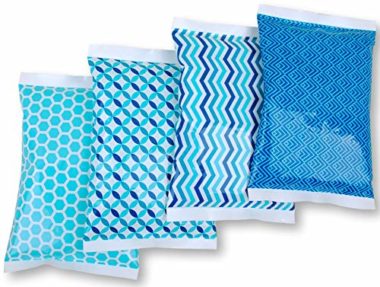
- Stand Out Features - Why We Love It
- Perfect size for lunch boxes and cold retention
- Some of the longest lasting ice packs for lunches
- Fun and stylish design
- Backed by a one-year warranty
- BPA-free and non-toxic
- FDA compliant manufacturing
- Tough, puncture and break resistant plastic casing
Dimensions of Individual Ice Pack: 6.7 X 4.3 X 1 inches
Total Pack Weight: 1.7 pounds
Stay Cool Reusable Ice Pack
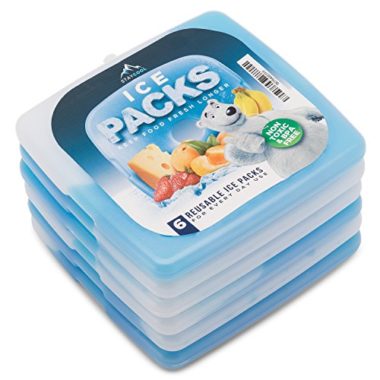
- Stand Out Features - Why We Love It
- Ultra slim and ultra light
- Great fit in small insulated bags and lunch boxes
- Impressive ice retention
- Non-toxic and nonbacterial materials
- BPA-free certified casing
- Easy to clean and fast freezing
Dimensions of Individual Ice Pack: 5.25” x 5” x 0.5”
Weight of Individual Ice Pack: Less than 4 ounces
YETI Refreezable Cooler Ice Pack
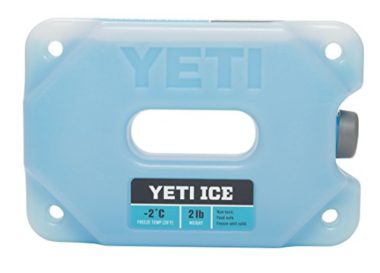
- Stand Out Features - Why We Love It
- Refreezable and custom shaped to freeze fast
- Extremely rugged, break-resistant build
- Non-sweat design
- Dialed in temperature for long lasting ice retention
- Variety of size for different cooler sizes
Dimensions of Individual Ice Pack: 7.9 x 5.4 x 1.7 inches
Total Pack Weight: 1.8 pounds
FlexiFreeze 88 Cube Ice Sheets Ice Pack
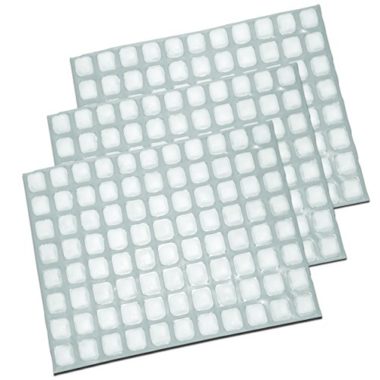
- Stand Out Features - Why We Love It
- Flexible even when frozen
- Composed of ice cubes and can be cut to the perfect size
- Composed of ice cubes that can be used to fill voids and air spaces
- Chemical-free water-filled ice sheets
- Versatile and suit different applications from cooling to pain relief
- Thick and durable construction, they don't pop easily
- Long lasting ice retention
Dimensions of Individual Ice Sheet: 15.5″ x 19.5″ x 0.625″
Total Pack Weight: 2.5 lbs
Polar Tech IB6 Ice Brix Ice Pack
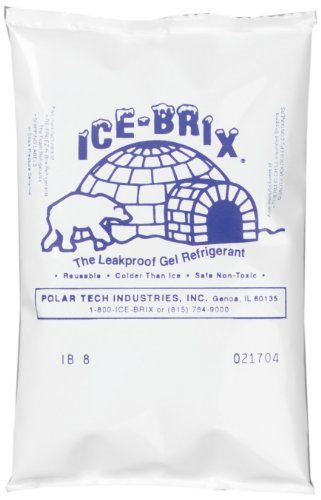
- Stand Out Features - Why We Love It
- Best ice packs for shipping perishable products
- Long lasting cold, even in sweltering transit conditions
- Rugged and durable ice packs can withstand the rigors of transit
- Efficient transfer of energy
- Custom imprinting of logo or custom design in the ice bags
- Non-toxic ingredients and FDA compliant
- Leak-proof design - gel sealed in a heavy-duty plastic pouch
Dimensions of Individual Ice Pack: 4 x 6 x 3/4 inches
Total Pack Weight: 6.1 ounces
Arctic Ice Chillin’ Brew Cooler Ice Pack
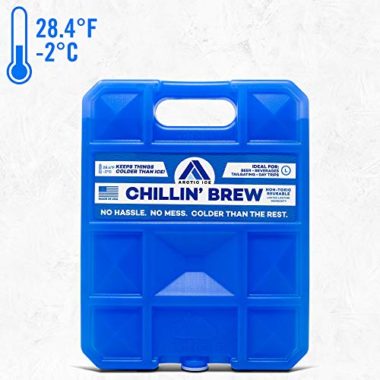
- Stand Out Features - Why We Love It
- Designed for keeping beer and other beverages chilled
- Long lasting ice packs that hold ice for a long duration
- Reusable up to 100,000 times without losing their shape
- Expanded surface area for fast and efficient cooling
- Non-toxic phase change materials
- Rugged and UV stabilized container
- Leak-proof spin welded cap
- Lifetime warranty against defects from workmanship.
- Handle makes grabbing them easy and safe
Ice Pack Dimensions: 7.5 x 1.2 x 9.5 inches
Total Pack Weight: 2.2 pounds
How To Choose An Ice Pack For Cooler – Buying Guide
The best cooler ice pack to go for will depend on how you intend to use them. Do you need compact ice packs for keeping lunches cold and fresh? Do you need durable and long lasting ice packs that can withstand rough treatment and exposure to hot weather during outdoor excursions such as fishing, hunting, and camping?
Keeping the intended purpose in mind, here are the most important factors to consider in order to choose ice packs that will deliver the cooling power you need and are safe to use.
Size
The first step is to figure out what size of cold packs will fit inside your cooler and deliver the ice pack cooling performance you want. When choosing an ice pack, check the dimensions and make sure you select an ice pack that will fit in your cooler together with the things you want to keep cold.
For lunch coolers, grocery totes, and small insulated bags, you need compact and slim ice packs that won’t take up too much of the valuable space. There are large cooler packs that will fit in large ice chests such a YETI or RTIC coolers. If you have a hard time finding an exact size, you can opt for a flexible ice sheet that can fit in odd spaces.
Duration
Determine how long you need the cooler contents kept chilled and choose ice packs that can retain ice for as long as you need them to.
If you’re embarking on a long outdoor expedition such as hiking or fishing, you need long lasting ice packs that can stay frozen for 48 hours or longer, even in hot conditions.
If you just want your lunch kept crisp and fresh and drinks pleasantly cool, an ice pack that can last for four to eight hours will be sufficient. The duration ice packs will last will also depend on how you use them.
Case
What kind of case are the ice packs wrapped in? If you will be embarking on outdoor adventures and need a rugged cooler that can stand up to being banged around, choose one with a hard shell that won’t leak or break easily.
If you need a flexible ice sheet that can fit in a tight place or around oddly shaped cooler contents, you will need a soft case such as nylon or foil that can bend and fit in tight spaces. The casing should still be tough enough to resist puncturing and breaking.
You might also like: Top Floating Coolers
Material
Ice pack materials include the material the ice packs are made of and the casing they are wrapped in. The packaging should be made of leak-proof and BPA-free materials that can withstand knocks and punctures.
Ice packs made of Phase Change Materials (PCM) hold ice incredibly well, as these kinds of materials transform from solid state to a liquid state at a lower temperature than that of ice and lock down the heat they absorb until a phase change is complete. This enables them to hold ice incredibly well keeping the cooler iced for a long duration.
Safety
For something that will come into contact with foods and drinks, safety is a very important consideration. Make sure the casing is safe to use in contact with foods and drinks and the ice pack chemicals won’t contaminate the cooler contents and cause harm in the event of a leak.
The ice packs should be non-toxic and the casing should be BPA-free. Always check the ingredients list and label to ensure that you choose ice packs that are safe to use.
Weight
By using ice packs, you’re adding more weight to the cooler. You will notice the extra pounds if you have to physically haul the cooler around such as to get to a secluded fishing or camping spot. Weighing the pounds is important so you can choose the ideal weight of ice packs for cooling performance and ease of handling.
FAQs
Q: Why Regular Ice Doesn’t Cut It in A Cooler?
Regular ice melts fast and can leave the cooler contents floating in a puddle and some items such as sandwiches a soggy mess. It is not the ideal ice to use in a cooler on long outdoor excursions such as camping or for shipping perishable products. It is also not cost effective for everyday use such as for keeping lunches cool and fresh, as it is not reusable. You have to purchase regular ice each and every time you need it.
Q: What About Adding Salt To Ice In My Cooler?
Adding salt to ice in a cooler lowers the melting temperature of the ice. Since it delays melting, it can be an effective way to make ice stay colder for longer.
Q: Are Re-freezable Ice Packs 100% Chemical Free?
No. While there are some water-based ice packs that are 100% chemical free, most re-freezable ice packs contain chemicals such as hydroxyethyl cellulose, sodium polyacrylate, and others. The majority of ice packs, however, do not contain harmful chemicals. The exception is petroleum ice packs that contain some chemicals that can contaminate foods in the event of a leak.
Q: Should Ice Packs Replace Regular Ice?
For everyday use such as for cooling lunches and grocery shopping, you can use ice packs as a convenient and economical replacement to regular ice. You can also use ice packs and regular ice together for longer ice retention and optimal cooling performance during outdoor activities such as kayaking and fishing.
Q: How To Dispose?
Let the ice packs thaw then cut off an opening and empty the fluid into the trash, as most ice packs are environmentally friendly and biodegradable. You can then recycle the plastic shell with other plastics.
Q: Ice Packs vs. Regular Ice: What’s the Difference?
Regular ice is composed of frozen water while ice packs are filled with a refrigerant gel or water and a viscous additive. Regular ice melts faster and forms a puddle in the cooler while ice packs are composed of a thick, viscous gel packaged inside a tough, moisture proof pouch that keeps the blue gel contained once it melts. Regular ice is easier to pack around cooler content than ice packs.
Globo Surf Overview
How long ice lasts in a cooler and items remain chilled and fresh depends on the quality of the cooler itself and the quality of the ice packs used. Using quality ice packs can keep your cooler icy and cooler contents chilled and fresh for longer. You can also use both regular ice and ice packs to keep normal ice blocks frozen for longer. At the end of the day, you will have fresh cooler contents and a dry and clean cooler. Ice packs are also economical since you can reuse them and save money on regular ice.
The best ice packs for coolers for maximum ice pack cooling performance are the right size for your cooler and have long-lasting cold retention. They are also well made to last and non-toxic so they are safe to use in contact with foods and drinks. All the best reusable ice packs for coolers reviewed above meet these requirements and deliver impressive ice pack cooling performance.



